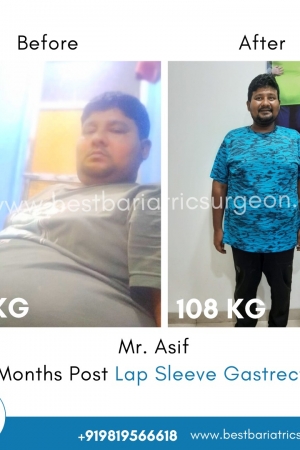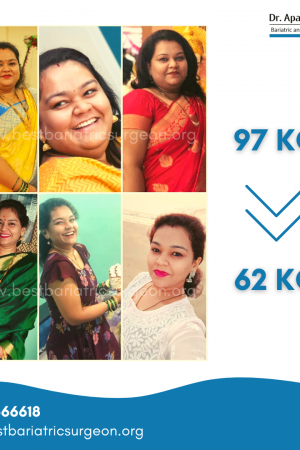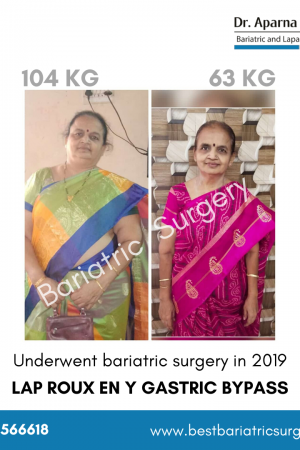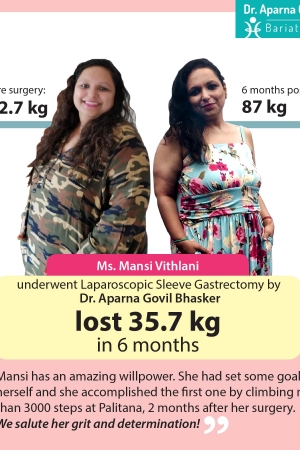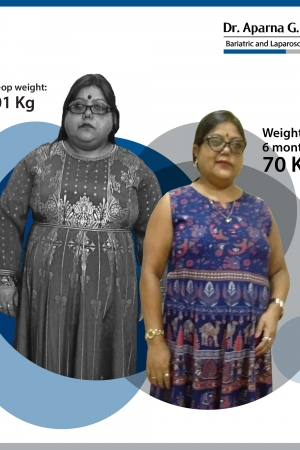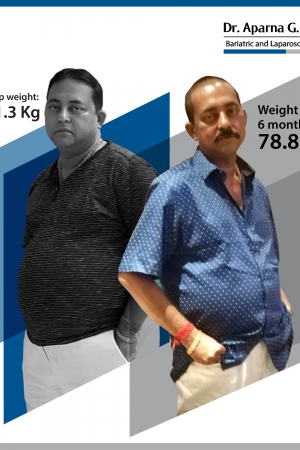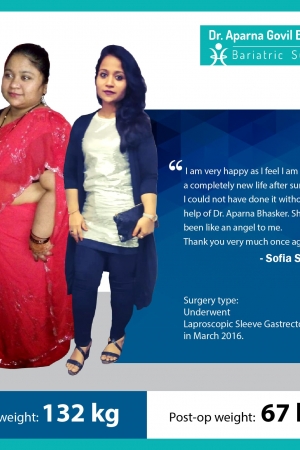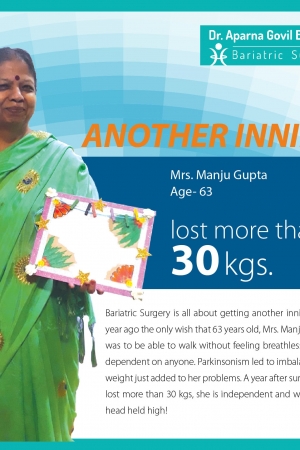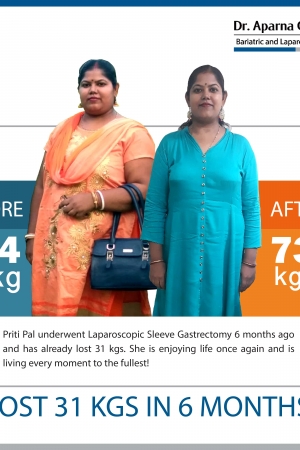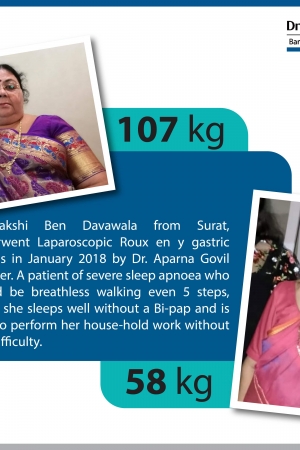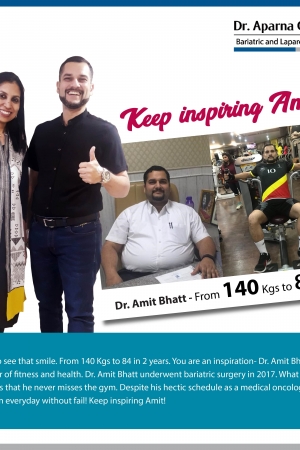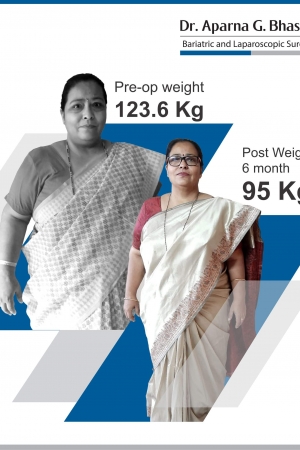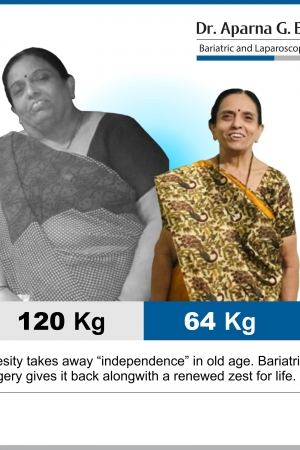
Bariatric Surgery in Kolkata (Weight Loss Surgery)
- Home
- Bariatric Surgery in Kolkata (Weight Loss Surgery)
Bariatric Surgery in Kolkata (Weight Loss Surgery)
“Motivation is what gets you started, habit is what gets you going.”
Morbid obesity or clinically severe obesity has emerged as one of the most dreaded diseases of this century. People who have attempted to lose weight, know how difficult it is to not only lose weight but also to maintain the weight loss. In our OPD on a daily basis, we see patients who put in their heart and soul into their efforts to lose weight. They go to multiple weight loss clinics, nutritionists, gyms, try yoga and everything else that is available. Unfortunately, more often than not, they do not achieve the desired results and tend to yo-yo between weight loss and weight gain. This process is extremely disheartening and demotivating for most people.
Currently, bariatric surgery is the only way that can lead to sustained weight loss in patients suffering from morbid obesity or clinically severe obesity.
Bariatric surgery/ weight loss surgery/ obesity surgery is the only proven method for sustained weight-loss in morbidly obese patients.
Obesity is classified as under:
| Classification for Caucasians/ Westerners(Kg/m2) | Classification for Asians
(Kg/m2) |
|
| Normal weight | 18.5 – 25 | 18.5 – 23.5 |
| Overweight | 25 – 30 | 23.5 – 27.5 |
| Class 1 obesity | 30 – 35 | 27.5 – 32.5 |
| Class 2 obesity | 35 – 40 | 32.5 – 37.5 |
| Class 3 obesity | 40 and above | 37.5 and above |
BMI Formula:
BMI= (weight in kg)/Height in m2)
What we need to realize is that just like any other chronic disease, obesity affects every organ of human body. Obese people have a higher risk of developing type 2 diabetes, high blood pressure, dys-lipidemia and subsequently heart disease. Obesity also leads to obstructive sleep apnoea, non-alcoholic fatty liver disease, gout, joint diseases, PCOD, increased risk of venous thrombo-embolism, gall bladder stones etc. Obese patients are also at risk for developing certain kind of cancers such as breast and endometrial cancer in women and colon and pancreatic cancers in men.
Bariatric Surgery in Kolkata
Bariatric surgery or weight loss surgery is the only proven method that leads to sustained weight loss in patients with clinically severe obesity. It also leads to a marked improvement in most of the associated diseases such as diabetes, high blood pressure, high cholesterol etc and decreases the overall risk of heart disease. Most bariatric surgery or obesity surgery procedures lead to about 60 to 75% excess weight loss.
Guidelines for weight loss surgery in Kolkata
The IFSO- APC (International Federation for Surgery for Obesity and Metabolic Disorders – Asia Pacific Chapter) guidelines for weight loss surgery are as under:
- Bariatric surgery/obesity surgery/weight loss surgery must be considered for the treatment of obesity for acceptable Asian candidates with BMI ≥ 35 Kg/m2 with or without any associated diseases.
- Bariatric surgery/metabolic surgery must be considered for the treatment of type 2 diabetes or metabolic syndrome for patients who are inadequately controlled by lifestyle alterations and medical treatment for acceptable Asian candidates with BMI ≥ 30 Kg/m2.
- Bariatric surgery/metabolic surgery may also be considered as a non-primary alternative to treat inadequately controlled type 2 diabetes or metabolic syndrome for suitable Asian candidates with BMI ≥ 27.5 Kg/m2.
Types of bariatric surgery in Kolkata
Bariatric surgery is an evolving branch of medicine. Bariatric surgeries performed at our hospital (Park-View Hospital, salt Lake City in Kolkata) include:
- Laparoscopic Roux en y gastric bypass
- Laparoscopic sleeve gastrectomy
- Laparoscopic adjustable gastric banding (not very popular any more)
- Endoscopic intra-gastric balloon insertion
- Laparoscopic single anastomosis gastric bypass (mini-gastric bypass)
- Laparoscopic revision surgery
Selection of the type of bariatric surgery in Kolkata
Which procedure suits you the best depends on many factors which include age, gender, weight, food habits, associated diseases, team and patient commitment etc. In our practice, you as the patient are our partner in the decision making. After the initial evaluation, the final decision about the procedure is taken after a mutual discussion between the doctor and the patient. Bariatric surgery is all about a lifestyle change and best results can be achieved only if the doctor and the patient work together as equal partners.
Preparing for bariatric surgery in Kolkata
Getting any surgery done is a major decision. Having faith in your doctor and the team is very important. We understand that surgery can be an intimidating experience for some people. Hence, we hand-hold you through every step of this journey. Rest assured that we will guide you at every step. The process begins with consultations with the doctor and the team. You will be advised tests and based on your reports and overall assessment, you along-with the doctor and the team will decide on the procedure that will work the best. Before the surgery, you will be on a high protein liquid diet for a minimum of one week. Prior to surgery you may also need to see other specialist like an endocrinologist, nephrologist, chest physician etc based on your medical history. You will need to get admitted on the evening before the day of surgery.
Expected weight loss after bariatric surgery in Kolkata
Bariatric surgery or weight loss surgery leads to significant amounts of weight loss. On an average after any of the bariatric/weight loss procedures most patients can expect to lose about 65 to 75% of their excess weight. This could be less or more depending on multiple factors such as post-operative diet, efforts put in terms of exercise, follow up by the bariatric team, associated co-morbidities, drug intake etc. Surgery leads to a considerable improvement in the quality of life of the patient and most patients are able to maintain atleast 50% of excess weight loss at the end of 5 years after the surgery which is much higher than any other form of weight loss.
Improvement in associated diseases
Bariatric surgery leads to a significant improvement in associated diseases. Type 2 diabetes becomes better in 80 to 98% of patients. A significant number of patients do not need to take any medications for diabetes after the surgery. Ofcourse, this also depends on the duration of diabetes, c-peptide levels, age and BMI of the patient. High blood pressure becomes better in almost 70% of the patients. There is an overall 80% improvement in metabolic syndrome. Surgery also leads to a significant betterment in other co-morbidities such as PCOS, joint diseases, gout, obstructive sleep apnoea, COPD etc.
| SN.NO | OBESITY ASSOCIATED DISEASES | EFFECT OF BARIATRIC SURGERY | PERCENTAGE IMPROVEMENT |
| 1 | Quality of life | Improves | Upto 95% |
| 2 | Relative risk of mortality | Decreases | Upto 89% in 5 years |
| 3 | Metabolic Syndrome | Improves | Upto 80% |
| 4 | Type 2 diabetes | Improves | 82 -98% |
| 5 | High blood pressure | Improves | 60 -70% |
| 6 | Hypercholesterolemia | Improves | 60-65% |
| 7 | Risk of heart disease | Decreases | |
| 8 | Obstructive sleep apnoea | Improves | 74 – 98% |
| 9 | PCOD | Improves | Upto 75% |
| 10 | Venous stasis disease | Improves | Upto 95% |
| 11 | Osteo-arthritis/Joint disease | Improves | Upto 41% |
| 12 | Urinary stress incontinence | Improves | Upto 44% |
| 13 | Depression | Improves | Upto 47% |
| 14 | Gout | Improves | Upto 72% |
| 15 | Infertility | Improves |
Bariatric Surgery/Obesity Surgery/ Weight Loss Surgery in Kolkata Patients Before After Photos
Bariatric Surgery Patient Video Testimonials
Post-operative schedule for follow up
Regular follow up is the key to success after bariatric surgery. After surgery, one has to follow up for 3 times in the first year with all reports and once every year thereafter. There are many changes pertaining to lifestyle, dietary habits, exercise schedule etc that need constant support and counselling. It has been seen that patients who follow up regularly and attend support group meetings, tend to get better results.
The biggest plus of coming to us for your surgery is our personalized care. Every patient is equally important for us and we assure you that we are very approachable after the surgery and your smallest queries will be addressed at the earliest.
Last but not the least, it is extremely important for the patient to be mentally prepared and be in a positive frame of mind before undergoing any kind of surgery. Positive attitude goes a long way in getting good results after surgery.
Today is the chance to change yourself for the better… Just do it!
About Dr. Aparna Govil Bhasker
Dr. Aparna Govil Bhasker is an accomplished Bariatric Surgeon and Laparoscopic GI Surgeon. Extremely passionate about her field of specialization. She completed her MBBS and MS in General Surgery in 2006, from Mahatma Gandhi Institute of Medical Sciences (MGIMS), Sewagram. Set up in 1967 by none other than the first health minister of India, Ms. Sushila Nayar, MGIMS is deeply rooted in Gandhian ethics. Read more


Surgeon in India


Bariatric Surgery: Pros and Cons
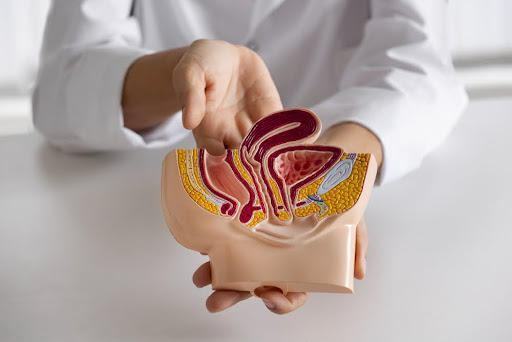
Types of Hernias and Their Treatment Options Explained
- Intra-Gastric Balloon Insertion Surgery
- Laparoscopic Adjustable Gastric Banding Surgery
- Gastric Sleeve Surgery / Laparoscopic Sleeve Gastrectomy
- Single Incision Sleeve Gastrectomy Surgery
- Laparoscopic Roux-en Y Gastric Bypass Surgery
- Laparoscopic Banded Roux-en Y Gastric Bypass Surgery
- Laparoscopic Mini Gastric Bypass Surgery /Omega Loop Bypass
- Laparoscopic Sleeve Gastrectomy with Duodeno-Jejunostomy Surgery
- Laparoscopic Duodenal Switch Surgery
- Laparoscopic Sleeve Gastrectomy with Duodenal Ileostomy (SADI) Surgery
- Laparoscopic Revisional/Redo Bariatric Surgery
- Metabolic Surgery for Diabetes
- Terms & Conditions
- Privacy Policy
- Sitemap

